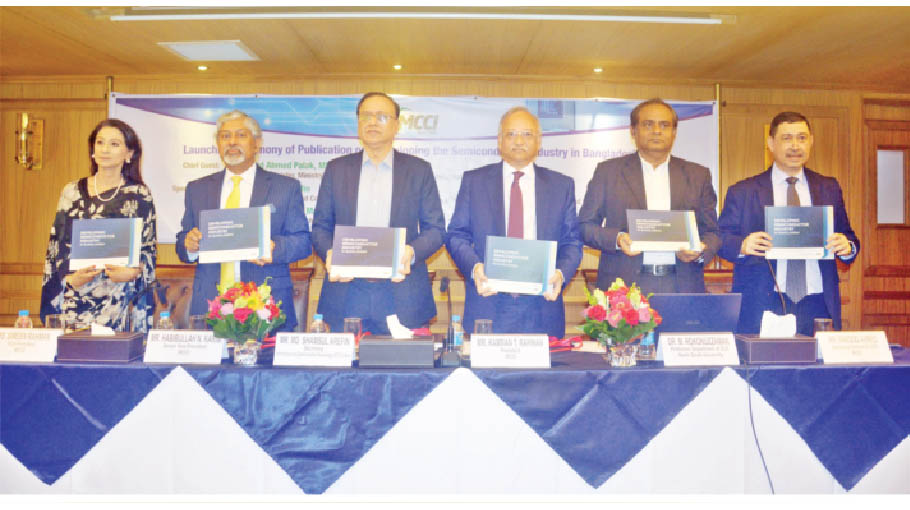Semiconductors crucial for future industrial ventures: Experts

Boosting the semiconductor industry could propel Bangladesh to the forefront of technology and progress, said experts at an event on Thursday.
They said the semiconductors were crucial for future industrial ventures of Bangladesh.
The Metropolitan Chamber of Commerce and Industry, Dhaka (MCCI) organised the event to launch a strategic document "Developing the Semiconductor Industry in Bangladesh" on Thursday at MCCI's Gulshan office.
Zunaid Ahmed Palak, State Minister, Ministry of Posts, Telecommunications & Information Technology attended the event as the chief guest, while Md. Shamsul Arefin, Secretary, Information and Communication Technology Division, Ministry of Posts, Telecommunications & Information Technology, attended as the special guest. The event was moderated by MCCI Secretary-General and CEO, Farooq Ahmed.
The report serves as a roadmap for potential investors and policymakers, guiding them on the path to developing the semiconductor industry in Bangladesh. It also refers to the current global leaders in semiconductor design and fabrication, providing valuable insights into their ecosystem.
During his welcome remarks, MCCI President Kamran T. Rahman highlighted MCCI's efforts to support the semiconductor industry in Bangladesh.
He stated semiconductors were crucial for future industrial ventures. Through this report, MCCI aimed to make a significant contribution to that cause.
A presentation was given by Dr. Yusuf Haque, Chief Technology Officer and Co Founder, eXo Imaging Inc. (USA), on how to bring semiconductor related technology to Bangladesh.
Dr. M. Rokonuzzaman, Professor, Department of Electrical & Computer Engineering, North South University, gave a presentation highlighting thekey features of the report.
He believed delving into the industry could help Bangladesh evade the middle-income trap while pursuing progress.
During his intervention, MCCI Senior Vice-President Habibullah N. Karim said that the report will be more than an academic guide for the semiconductor industry. It will also provide guidance on mobilizing investment, policy frameworks, and resources.
He also expressed great optimism regarding the industry's potential to reach a billion-dollar valuation. Through this report, MCCI aimed to encourage more individuals to join the semiconductor industry and nurture a supportive ecosystem.
While addressing, Md. Shamsul Arefin, mentioned that it was time for making a broad commitment to a high-tech future targeting high economic growth.
For the semiconductor industry to flourish, he pointed out the need to have a comprehensive national policy, tax breaks and subsidies, strengthened intellectual property laws and their enforcements, the availability of clean rooms, testing laboratories, manufacturing facilities, and the promotion of locally manufactured semiconductor chips.
Chief Guest Zunaid Ahmed Palak, commended MCCI for its proactive initiative in launching the report.
Artificial intelligence, microchip designing, robotics, and cyber security were already identified as the four frontier technologies and focus areas by the Prime Minister's ICT Affairs Adviser, Sajeeb Wazed Joy.
Therefore, boosting the semiconductor industry could propel Bangladesh to the forefront of technology and progress.
He also informed that the development of a nano-laboratory in BUET was in progress.
Before concluding, he assured of his ministry’s full support in ensuring Bangladesh’s progress in the semiconductor industry.




